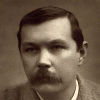“ But no man has the right to set himself up as a purely moral judge and requiter, and punish the misdeeds of another with pains which he inflicts upon him, and so to impose penance upon him for his sins. ”
Arthur Schopenhauer, The World as Will and Representation (1819). copy citation
| Author | Arthur Schopenhauer |
|---|---|
| Source | The World as Will and Representation |
| Topic | pain sin |
| Date | 1819 |
| Language | English |
| Reference | |
| Note | Translated by R. B. Haldane and J. Kemp |
| Weblink | http://www.gutenberg.org/files/38427/38427-h/38427-h.html |
Context
“Yet it is always appearing in the writings of many jurists, under all kinds of lofty phrases, which amount to nothing but empty words, as: Through the punishment the crime is expiated or neutralised and abolished, and many such. But no man has the right to set himself up as a purely moral judge and requiter, and punish the misdeeds of another with pains which he inflicts upon him, and so to impose penance upon him for his sins. Nay, this would rather be the most presumptuous arrogance; and therefore the Bible says, “Vengeance is mine; I will repay, saith the Lord.” But man has the right to care for the safety of society; and this can only be done by interdicting all actions which are denoted by the word”
source


